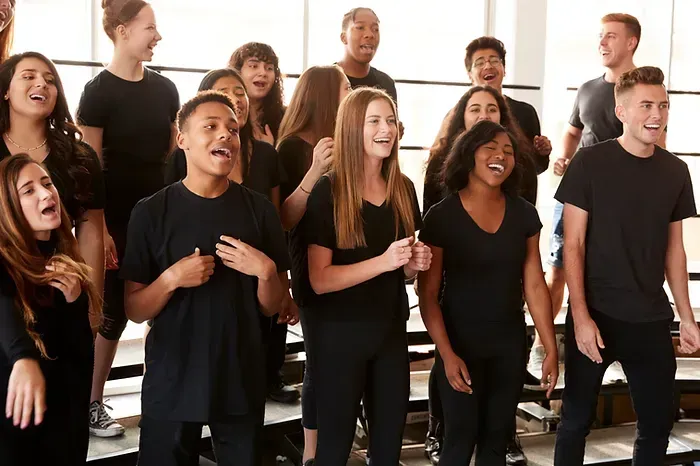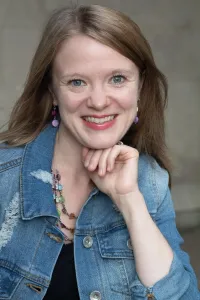
Check Out The Blog

Choral Singing is Kind of Like Life, I Think
Choral Singing is Kind of Like Life, I Think
You know what I muse on a lot?
How choral singing is a reflection of life.
I know, that sounds a little cheesy. But hear me out.
I initially thought I gravitated toward choral singing because I didn’t really care for opera. (Another post for another time.)

But over the years I’ve come to recognize that I’ve been drawn to it for its own sake. And I think it’s not only because choral singing is in line with my musical and vocal skill set, but also aligned with my values as a human.
Such as? You ask.
Well, musically speaking - I’m an excellent reader, have a clear tone, can sing in the center of the pitch with or without vibrato, with a variety of tonal colors in multiple musical styles, and adjust my vocal production accordingly - all while staying in tune and singing musically. I enjoy a good vocal and musical challenge, and am confident enough in my skills to walk into one-to-a-part gigs on incredibly short notice. I’m also sensitive to the musicians around me, and can respond and adjust and recalibrate as the situation demands.
(The flip-side of this is that I have little patience - in a professional setting, that is - for poor reading, repeated mistakes, phone-it-in musicianship, lazy artistry, diva complexes, a lack of collaborative awareness, or generic “opera” technique applied to literally everything.)
So, just sayin’, if you need a versatile soprano for a choral project you’re doing and want someone who is utterly reliable and pretty darn good at this, then hit me up.
But, back to those human values, because that’s what I really want to talk about here.
“What do you mean by human values?” you ask.
Well, being an integral part of a whole. Exercising responsibility. Collaborating.

Listening. Responding. Exercising agency and stewardship over my gifts. Serving something bigger than myself. Putting self-focus aside, and instead offering my skills and authentic self-expression at the service of something that can be greater than the sum of its parts.
Over the years, I’ve discovered that I love small-scale choral singing the best, for those reasons. While I also love singing in larger choirs - all that sound from every direction can feel thrilling, after all - I prefer a more intimate setting where each person’s contributions really matter. I feel the most at home in one- or few-to-a-part situations where all the singers can really listen to each voice, get to know how the other people sing, and create something that is unique based on the sounds that are in the room.
I often think about how much we balance as choral singers in these kinds of settings. We’re thinking about our own sound, how we blend and balance with the group while maintaining our own vocal integrity; we’re thinking about tempo; we’re thinking about tuning; we’re listening to what’s going on around us; we’re responding to directives and stimuli left and right; we’re constantly recalibrating and tweaking and adjusting so as to produce the most unified outcome possible.
But here’s the thing: if you are too wrapped up in your own “stuff,” you can’t do any of those things.

By “stuff,” I mean that if you are too preoccupied with your technique, if you are struggling with basics like pitches and rhythms, if you’re struggling to keep up or feel like you’re drowning in overwhelm, then you can’t listen. You can’t adjust for tuning or balance. You can’t experiment with what kind of tone color or resonance is going to serve the ensemble the best. You can’t respond to someone else’s musical gestures or directives.
You need to have the musical skills to do the basic things like sight-read and learn music quickly. You need to be able to take personal responsibility for things like tempo and intonation. You need to have the technical competency to be able to execute musical gestures and exercise agency over your own sound. You need to have the ensemble skills required to listen and respond. You need to have self-awareness of how your own sound is fitting into the whole, and to ask yourself if your contributions are enhancing or detracting from the desired result. You need to be willing and able, in some cases, to put your solo sound and the “bel canto technique” you learned in conservatory aside - because, contrary to what many of us were taught back in the day, a “classical” sound is only one of many tonal outcomes, and it doesn’t work for everything.
If you can’t exercise those basic skills, then you hold the whole group back.
I really do mean that.
What’s more, if you are holding things back in this way, then you are literally making it harder for other people - the people who ARE doing the things - to do their job well.
I’m pretty good at this choral thing, as are a lot of other folks I know, but we can only do so much to work against that kind of entropy.
We shouldn’t have to work against anything.
Now, again - I’m talking about professional settings here, where the singers in question are trained and experienced and should have all the tools they need to make this work. I’m not talking about community choirs or other non-professional settings, where the expectations are, understandably, completely different.

But friends, this is why we need to cultivate musical skills.
And we can’t stop there.
The point of being a good sight-reader is not to be good at sight-reading. It’s so you can get to the point where you can make meaningful musical decisions sooner.
The point of having good technique isn’t to have good technique. It’s so you can use your voice in a variety of ways, as the music demands, to do something expressive.
The point of having a good ear is not just to have a good ear. It’s so that you can listen and respond to what your collaborators are doing and help create a unified sound.
We build skills and work on our instruments so that we can do something meaningful. And our impact will be limited - or even negative - if we aren't doing that work and stewarding our gifts and skills in the right way.
I think that this mirrors life in so, so many ways.

Part of our purpose here in this life is to serve and connect with others. To build up others. To co-create a world where we can live authentically and allow others to do so as well. To use our gifts and talents and resources toward causes greater than ourselves.
To do all of that, we need to speak and we need to listen. We need to have confidence in ourselves but not hubris. We need to hold ourselves accountable as much as we do others. We need to lead, and allow others to lead us.
We need to exercise agency, responsibility, and ownership. Did something awesome? Own it. Messed up? Own that, too.
We need to exercise charity and empathy. We need to know when to stand our ground and when to defer.
We need to have a level of self-awareness that keys us into those times when, inevitably, we hurt someone or make their lives more difficult due to our vices and negativity. Just like in a choir, those people who are doing all the right things can still try their utmost - but their efforts will be undermined if they have to spend energy working against you and your “stuff.”
In order for this kind of connection and service and bridge-building to happen, we need to be working on ourselves - cultivating virtues, rooting out vices, developing emotional intelligence and self-awareness, and exercising humility. And part of that means dealing with our “stuff.”
Because, just like with choral singing, if you are too wrapped up in your own “stuff” - difficulties, challenges, struggles - then there is no way you can be there for other people.

Or, at the very least, your capacity to connect with and express empathy toward them will be severely diminished.
“Express” is the key word here. it’s not enough to feel empathy or connection or compassion. We have to express these things.
Empathy and connection and compassion do little good unless they are expressed outwardly. And in order to be able to express, you have to deal with your “stuff.” The stuff that makes you put up walls, that puts you in a place of fear, that impedes your vulnerability, that places you and your issues and problems at the center of your universe, that puts you in a space where you just blame other people or circumstances for your problems instead of taking ownership for them.
The same things that hold us back as performers, as people who take the stage and share our music with people, are often the same things that hold us back from expressing ourselves to others.
Why? Because at the root of it is fear. And fear breeds a whole host of vices, if it is not dealt with properly.
This is why musicians cannot ignore their personal growth. It’s why they should not ignore their mindset. Making art is a human thing and a reflection of your reality.

So what reality are you bringing to your music?
A reality in which you can fully, confidently express yourself, because you’ve done and continue to do the work required to make meaningful contributions and create positive impact on others?
Or a reality in which you’re enmired in your own problems, issues, and challenges, such that you’re blinded to what’s going on around you and incapable of any meaningful connection?
On the cusp of this new year, I want to invite you all - whether you are an artist or not - to make space for this work and these kinds of connections in your life. To encourage you to prioritize your personal growth - physically, mentally, emotionally, creatively, spiritually.
Because we are created for significant, important things. We are created with a purpose. The One who created you has a plan for you.
Let this be the year you live your purpose and do those significant, important things, according to that plan. Maybe you’re already doing them - in which case, keep it up. But if you feel you’ve been on the edge of something great for a while, and have been trying to summon the courage and confidence to go all in, then let this be a word of encouragement for you.
Do the work. Go after the things. Because your contributions are important and needed.
